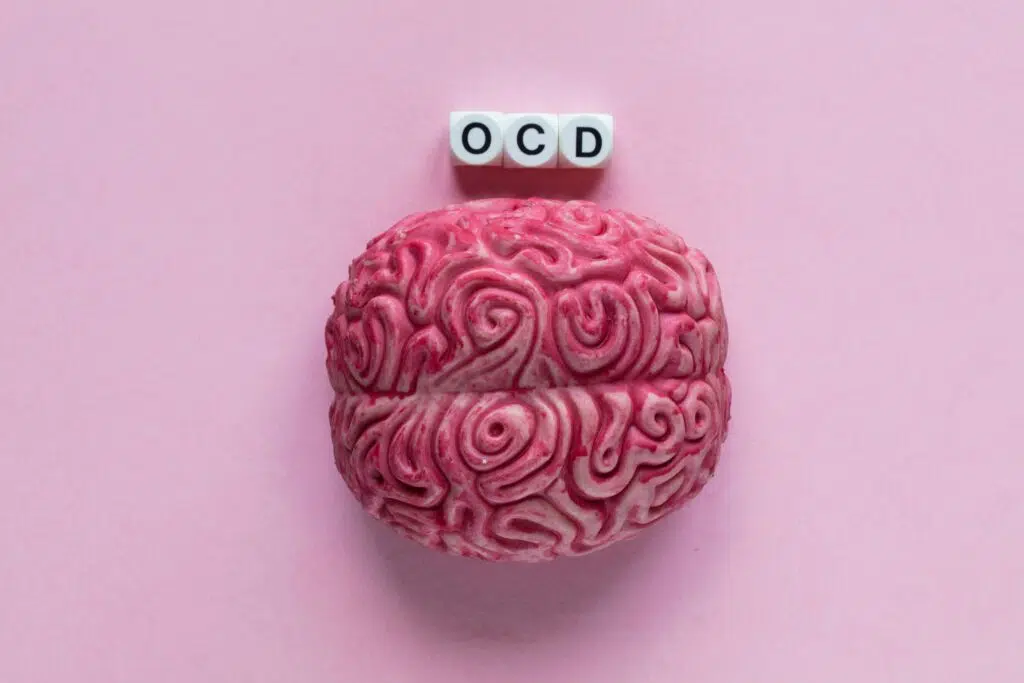Can OCD Be Cured?

OCD involves thoughts, feelings, sensations, and behaviors. When you talk about curing OCD, it’s difficult to cure those things as they are part of being a human. OCD is a condition that doesn’t just heal and fix itself. Generally, it cannot be cured completely. However, the good news is that you can get it under control, recover, become present, and live a healthy and happy life.
What Does OCD Stand For?
Estimates suggest that 2 to 3 million adults in the United States currently have OCD. OCD stands for obsessive-compulsive disorder. It’s a mental health disorder that can affect people of all ages. Within OCD, you have obsessions and compulsions:
- Obsessions are thoughts or impulses that happen again and again that feel out of your control. People with OCD don’t want to have these thoughts and many individuals understand that they are even illogical thoughts. Within OCD, obsessions are time-consuming and often accompanied by an intense feeling of anxiety or fear that you have to do something in a way that’s perfect or “just right.”
- Compulsions – these are the behaviors that sometimes follow obsessive thoughts to neutralize that thinking. Compulsions are a temporary solution to make the obsession go away at that moment. In individuals with OCD, there is a drive to engage in these obsessions and compulsions to prevent the negative consequences that could occur by not doing it.
How OCD Works
Because obsessions are involuntary and intrusive thoughts, you don’t want to have these thoughts. Over time, the obsessions and compulsions that follow can become more time-consuming and create anxiety in themselves. OCD can create a vicious cycle of obsessive thoughts and anxiety followed by behavior that offers temporary relief. The cycle then starts again. If you think of OCD as a loop of thoughts and behaviors that happen repeatedly, the longer you’re in the cycle, the stronger it gets. While breaking the cycle is hard, it’s an essential step in OCD recovery.
Potential Causes of OCD
The exact cause or causes of OCD remains a mystery somewhat. But experts believe that risk factors include:
- Genetics
- Environment
- Brain abnormalities
- Exposure to trauma
- Underlying mental health issues
Dr. Tirrell De Gannes, Psy.D., licensed clinical psychologist in New York City, says, “In regard to causes, OCD is an amplified sense of anxiety paired with attempted means of control either over the stimulus or over one’s own sense of anxiety. Falsely conditioned/ paired means of control are what we see as compulsions.
For instance, if someone feels tapping on a desk 7x improves their ability to avoid a bad outcome, then they are likely to continue that behavior. Obsessions are the intrusive thoughts that go unchallenged or unsuccessfully challenged. That means the anxiety persists because it is not satisfied with mental solutions.”
Can OCD Be Caused By Trauma?
Ongoing anxiety or being part of a stressful event could make OCD worse or trigger it. One study investigated the effects of traumatic experiences like stressful life events and the onset of OCD. They found that over 60% of patients experienced a stressful life event before the onset of OCD. As conditioned anxieties and fears get worse by performing compulsive behaviors in OCD, the study concluded that understanding the onset situation is beneficial for effective treatment.
Can OCD Cause Depression?
Obsessive-compulsive disorder is not just one of the most common psychological disorders, but it can be one of the most debilitating and distressing conditions. At its most severe, it can impact a person’s ability to go to work, maintain relationships, run errands, or even take care of themselves.
The relationship between OCD and depression is a complex one. It probably comes as no surprise that OCD is often associated with depression. OCD involves unwanted and intrusive thoughts, compulsions, and anxiety. Although depression and OCD are categorized as different disorders, the high occurrence of the two together has led many experts to debate the nature of the relationship.
Studies suggest that about 25-50% of people with OCD also meet the criteria for a major depressive episode. Symptoms of a major depressive episode include constantly feeling down for more than a few weeks, having trouble sleeping, and experiencing changes in interests, weight, and appetite.
Many people with OCD suffer from depression. While the two disorders are very different, they both negatively impact an individual’s life. Some research suggests that people with OCD tend to develop depression after the onset of OCD, and maybe the stress of living and dealing with OCD could trigger depression. In many cases, people with OCD also don’t develop depression. Having OCD doesn’t mean you will have depression, but it’s not unusual for those with OCD to be affected by symptoms of depression.
Can OCD Be Cured?
Dr. Tirrell De Gannes says, “Because OCD is a higher manifestation of anxiety, it can never be 100% alleviated, but symptoms and thoughts can be greatly reduced, even to more realistic/ normalized levels, given enough time and proper treatment.”
While there isn’t a way to completely cure OCD, treatment can help manage obsessions and compulsions to the point where they don’t interfere with your daily life as much. As OCD is a type of chronic condition, there’s a chance that it can come back, but good treatment and management can help prevent this from occurring.
With the current medical knowledge, there isn’t a cure that will get rid of OCD forever. But, there is an exceptionally good treatment for OCD in exposure and response (ERP) therapy, a type of cognitive behavioral therapy (CBT).
ERP is a type of behavioral therapy specifically designed for OCD. It exposes individuals to situations that provoke their obsession and the associated distress while encouraging them to resist the urge to carry out the compulsive behavior. The exposure to situations is gradual. Over time, ERP can help to reduce anxiety and break the cycle of OCD. Essentially, ERP gives patients coping skills so that when a triggering situation arises, they can tap into these skills and stop the compulsion from taking over.
How Thriving Center of Psychology Can Help
If you’re wondering, can OCD go away on its own? The answer is, typically, OCD is not likely to go away by itself. But OCD can be treated to help you better manage the disorder.
“I believe in most cases, OCD is more solidified because of misunderstandings of what causes and what is treating/ controlling their feelings,” says Dr. Tirrell De Gannes.
While OCD symptoms can fluctuate in intensity over time depending on stress levels, it’s important to seek out treatment as obsessive-compulsive symptoms may grow and become chronic. ERP therapy is often the first course of treatment as it has a solid body of supporting research behind it. However, in some cases, a combination of therapy and medications may be effective. Treatment for OCD is dependent on your individual case and symptoms.
If you or someone close to you is struggling with OCD, the team at Thriving Center of Psych can help. Our team of psychologists can help you to understand and uncover the road to recovery. Request an appointment online or call our offices today to start your journey.

Sustaining Love: What to Do When the Honeymoon Phase Fades
There’s nothing quite like that initial attraction and spark where you just can’t get enough of your partner. But as the months and years roll on, it’s normal for relationships to transition through stages, and dynamics can shift.

All a Bad Dream? 1 in 4 Think Their Nightmares Predicted the Future
Americans have a lot on their minds. From navigating daily stress due to work or mental health to grappling with bigger widespread issues like politics, climate change, or crime, it’s safe to say there’s a lot to think about daily. For many, stressors aren’t only encroaching on their minds during waking hours, but also when they try to sleep in the form of nightmares, or bad dreams.

Psychological Challenges with Remote Working
While we can meet our loved ones in person without masks, the pandemic brought some changes that have stuck. Remote working has transformed the workforce. Some companies have chosen a fully remote approach, while others are welcoming their employees back to the office full-time.

Survey: 72% of Americans are Stressing About the Upcoming Presidential Election
Political viewpoints in the U.S. have always been contentious, but is the impact of politics in the United States making it difficult for people to live their everyday lives? With some anticipating another brutal and long campaign season ahead of the upcoming 2024 presidential election, nearly half of Americans say politics is negatively impacting their mental health.




